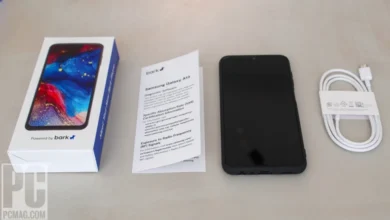Comprehensive Guide to Understanding Calls from 602-671-3998
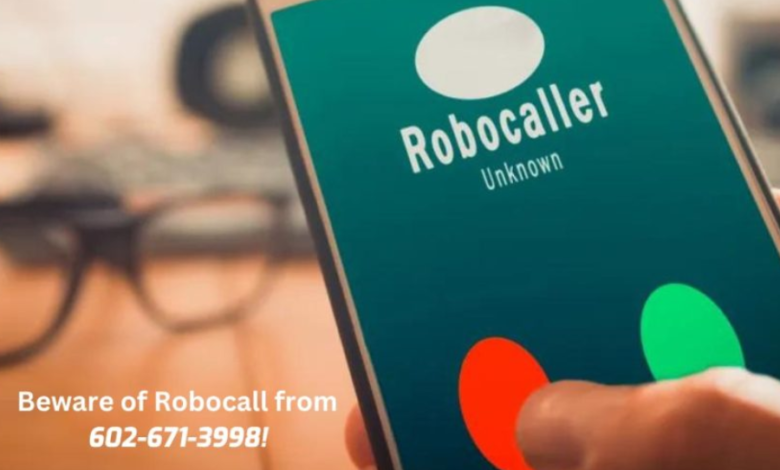
Introduction
In today’s hyper-connected world, unsolicited phone calls have become a constant source of frustration. The Federal Trade Commission (FTC) reports that millions of people across the U.S. receive unwanted telemarketing and robocalls each year, making it a widespread problem. As a result, many individuals remain vigilant, wary of potential scams. If you’ve recently received a call from the number 602-671-3998, you may be questioning whether it’s a legitimate call or part of a scam. This guide delves into the issue of telemarketing and robocalls, with a focus on the number 602-671-3998, while offering tips to safeguard yourself against unwanted calls.
Understanding Telemarketing and Robocalls

Defining Telemarketing
Telemarketing is a marketing strategy that involves reaching out to potential customers through phone calls to promote goods, services, or offers. Typically, these calls are made by live agents who engage with recipients, aiming to either close a sale or gather useful customer information, such as leads. While telemarketing can be a useful tool for legitimate businesses to connect with their audience, it is often perceived as intrusive when misused. In compliance with legal standards, telemarketing remains a valid form of outreach, but it can quickly cross into unwelcome territory if it disregards consumer rights and regulations, such as calling outside of permitted hours or ignoring opt-out requests.
The Rise of Robocalls
Unlike telemarketing calls, which are made by live representatives, robocalls rely on automated systems to deliver pre-recorded messages to phone users. While some robocalls serve legitimate purposes—such as confirming appointments, providing emergency notifications, or delivering important public messages—many have earned a notorious reputation due to their heavy use in fraudulent activities. The rise of robocalls has drastically changed how consumers perceive incoming calls, with many choosing to ignore unfamiliar numbers altogether. This surge in robocalls has contributed to a growing sense of distrust in phone communications, leaving many people on edge when they see unknown numbers pop up on their caller ID.
Examining the Source of Calls from 602-671-3998
Conducting Online Research
To begin investigating whether calls from 602-671-3998 are potentially fraudulent, start by conducting a thorough online search. Enter the number into popular search engines and look for user reports, reviews, or complaints associated with it. Many individuals report suspicious numbers on forums or websites dedicated to identifying scam calls, which can provide valuable insight into the nature of the calls. If multiple sources indicate that the number is problematic or linked to scams, you can take the necessary precautions to protect yourself. However, remember that online information should be cross-referenced for accuracy to avoid misleading conclusions.
Using Reverse Lookup Tools
One effective method for verifying the legitimacy of phone numbers like 602-671-3998 is using reverse lookup services. Platforms such as Whitepages, Truecaller, or similar apps allow you to input a phone number and receive details about its owner or organization. These tools can reveal whether the number is connected to a known business, a personal line, or if it has been flagged for suspicious or fraudulent activity. While reverse lookup tools are not foolproof, they offer a quick way to assess whether a number has been previously reported for scams or if it’s linked to a reputable source.
Reviewing Consumer Reports and Scam Databases

For a deeper investigation, consult resources like consumer protection websites or online databases dedicated to identifying scams. Websites such as Scambusters, the Better Business Bureau (BBB), or the Federal Trade Commission (FTC) often keep updated lists of phone numbers associated with fraudulent activities. These resources provide detailed information on common scams, trends in telemarketing fraud, and specific numbers reported by consumers. Checking these databases can help you confirm whether 602-671-3998 has been officially flagged for scam-related calls, giving you additional peace of mind when deciding how to handle future communications from the number.
Common Types of Scams
Fraudsters have found ways to exploit both telemarketing and robocalling techniques to scam unsuspecting individuals. Here are a few common types of scams to look out for:
- Debt Collection Scams: In this type of scam, the caller pretends to be a debt collector, often threatening legal action or arrest if the victim doesn’t immediately pay a supposed debt. They often prey on fear, pushing individuals to make hasty decisions without verifying the legitimacy of the claims.
- Prize and Lottery Scams: These scams inform victims that they’ve won a valuable prize, such as cash, vacations, or luxury goods, but require them to pay an upfront fee or provide sensitive personal information to claim the “reward.” This tactic lures victims with excitement before defrauding them.
- Tech Support Scams: Fraudsters impersonating technical support agents contact individuals, claiming their computer has been infected with a virus or that urgent repairs are needed. The scammer then convinces the victim to pay for unnecessary services or gains remote access to the computer, further compromising personal data and finances.
By understanding these common tactics, individuals can better protect themselves from falling victim to telemarketing and robocall scams. It’s essential to stay cautious and always verify the legitimacy of any unsolicited calls, especially when sensitive information or payments are involved.
Recognizing the Signs of a Scam
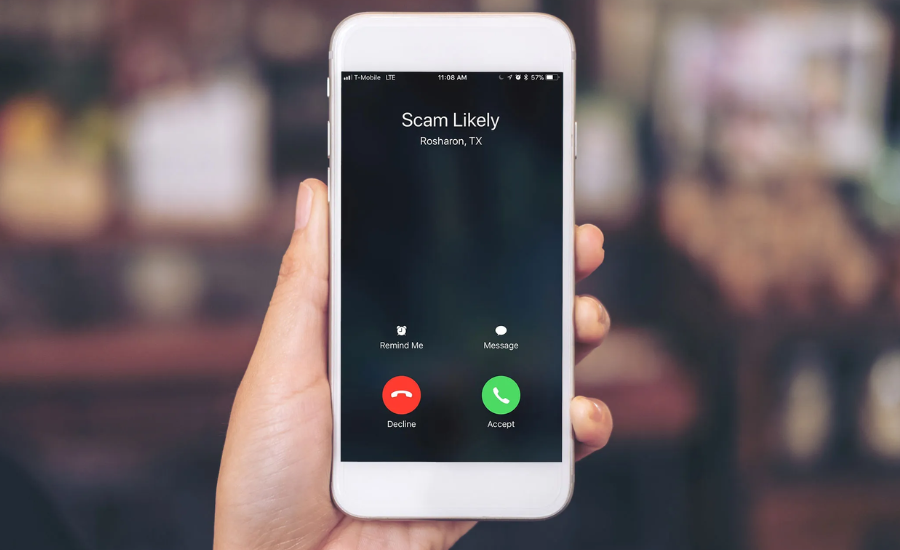
Pressure Tactics
A key indicator of a scam is the use of aggressive or high-pressure tactics designed to push you into making hasty decisions. Scammers will often create a fabricated sense of urgency, claiming that immediate action is necessary to avoid serious consequences, such as legal trouble, loss of services, or financial penalties. They might insist that you need to pay a fee right away or provide sensitive personal details without delay. This type of manipulation is intended to prevent you from thinking clearly or verifying the legitimacy of the call. Always be cautious of any phone call that demands immediate action or creates panic, as legitimate organizations typically allow time for consideration and verification.
Unfamiliar Numbers
Receiving a call from an unfamiliar number should always raise a flag of caution. Scammers frequently use numbers that appear to be local or familiar by mimicking your area code to increase the chances of you answering. These techniques, known as “spoofing,” are meant to trick you into thinking the call is coming from a trustworthy source. If you don’t recognize the number and especially if the call was unsolicited, it’s advisable to approach with caution. Take the time to investigate or verify the number before engaging further. Legitimate organizations rarely make unsolicited calls, and a bit of skepticism can go a long way in protecting you from fraud.
Unusual Requests
Scammers often ask for information that legitimate businesses would never request over the phone. Be highly suspicious if you’re asked to provide personal details, such as your Social Security number, banking information, or even payment through unconventional methods like gift cards or wire transfers. These are major warning signs, as reputable companies and institutions typically follow strict procedures to safeguard your information and would not demand such sensitive data in an unsolicited phone call. If you receive any requests that seem unusual or out of place, it’s best to hang up and contact the organization directly using a verified number to ensure the request is genuine.
How to Identify Robocalls
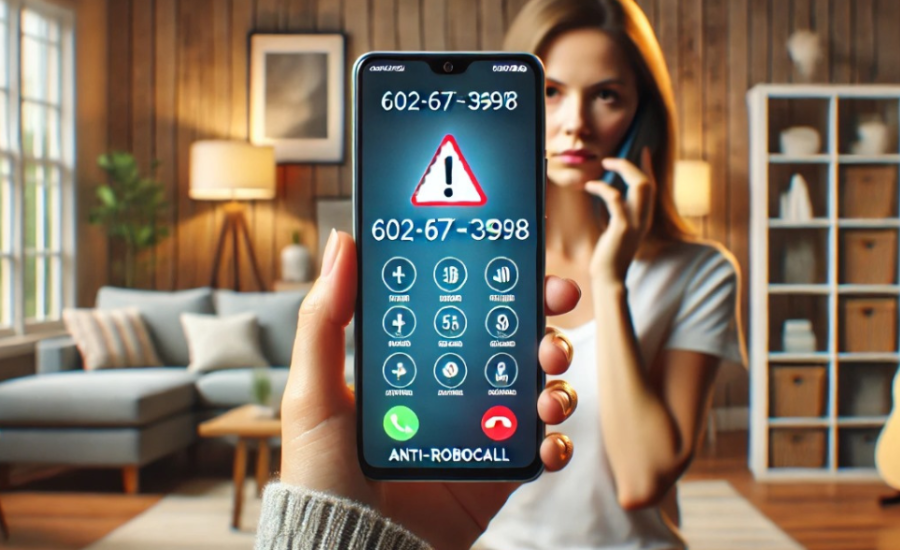
Recognizing robocalls can be tricky, especially since scammers often use advanced techniques to disguise their identity. However, there are specific signs you can look out for to determine whether you’re dealing with a robocall.
Caller ID Spoofing
One of the most common tricks used by robocallers is caller ID spoofing, where they manipulate the caller ID to display a familiar or local number, even though the call is coming from a different source. This makes the call seem more legitimate and increases the likelihood that you’ll answer. If you receive an unexpected call from a number that seems familiar, but you aren’t expecting the call, proceed with caution. Just because a number looks local or recognizable does not guarantee that the call is safe. Always question the legitimacy of the call, especially if the caller starts making unsolicited offers or demands sensitive information.
Unexpected Calls
Another telltale sign of a robocall is an unsolicited call from a number you don’t recognize. Robocallers often target random numbers, hoping someone will pick up. If you’re not expecting a call, especially from unfamiliar numbers like 602-671-3998, it’s generally safer to let the call go to voicemail. This allows you to review any message left behind without the immediate pressure of responding during the call. If the message seems suspicious or vague, it’s best not to return the call and instead verify the number through trusted sources.
Unusual or Generic Greetings
Robocalls often begin with a pre-recorded message rather than a live representative. The greeting may be vague and impersonal, such as “This is an important message for you,” or it may mimic official language like “This is the IRS calling regarding your tax return.” Legitimate calls from businesses or government agencies will typically include specific details, such as your name or a relevant account number, rather than a generic introduction. If the call lacks personalization and begins with an automated voice, it’s likely a robocall.
Pressuring or Threatening Language
Another red flag that signals a robocall is the use of aggressive or threatening language. Robocallers often try to create a sense of urgency or fear, pressuring you to take immediate action. They may claim you owe money, face legal consequences, or that your personal information has been compromised, urging you to provide payment or sensitive details right away. Legitimate organizations, such as banks or government agencies, do not communicate this way. If a call feels overly rushed or coercive, it’s a strong indication that you’re dealing with a robocall. Always take a moment to assess the situation, and never feel pressured to respond on the spot.
Safeguarding Yourself Against Telemarketing and Robocalls
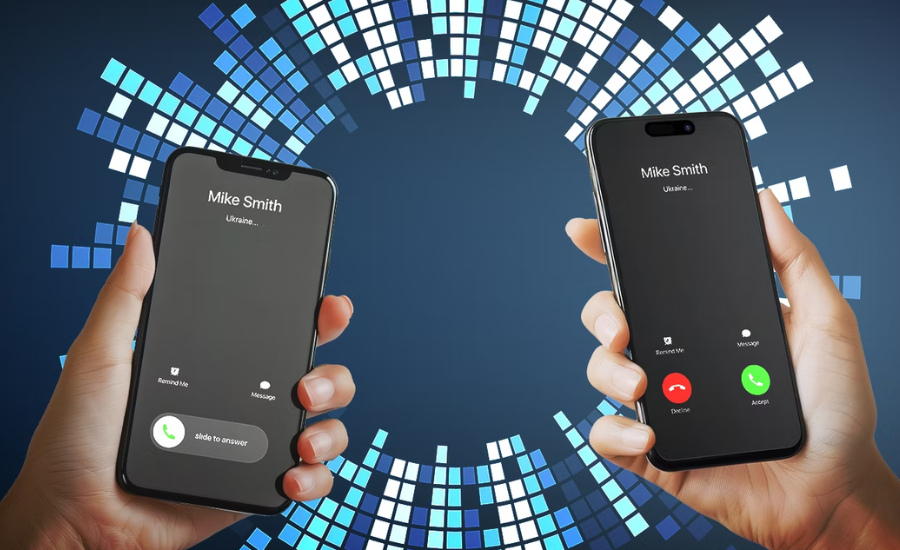
Registering with the Do Not Call Registry
A proactive step to limit unsolicited telemarketing calls is to register your phone number with the National Do Not Call Registry. This government-run service allows consumers to opt out of receiving calls from legitimate telemarketers. While this registration can help minimize the number of telemarketing calls, it’s important to note that it won’t completely block robocalls, especially those from scammers or illegitimate sources. It’s still an essential tool to reduce the volume of unwanted marketing calls and can make it easier to spot the fraudulent ones that continue to come through.
Understanding Caller ID Spoofing
Caller ID spoofing is a tactic frequently used by scammers to disguise their actual phone number, making it appear as though the call is coming from a familiar or local source. This can lead you to trust the call, especially if it resembles a number you recognize or expect. Be cautious when you receive unsolicited calls, even if the number looks trustworthy. If you’re unsure, let the call go to voicemail or verify the identity of the caller before engaging in any conversation. Remember, legitimate organizations rarely call out of the blue, and when in doubt, always verify the legitimacy of the caller.
Utilizing Phone Settings to Block Unwanted Calls
Modern smartphones are equipped with features that allow users to block specific numbers or screen out potential spam calls. Take advantage of these built-in settings to manage unwanted calls effectively. Many smartphones have automatic filtering options, while additional apps can be downloaded to further enhance your phone’s ability to detect and block spam or scam calls. By regularly updating these settings, you can better protect yourself from the flood of telemarketing and robocalls. These tools won’t stop every call but can reduce the frequency and provide some relief from persistent robocallers.
Steering Clear of Phishing Attempts
Phishing calls are designed to trick you into revealing sensitive personal information or financial details. To protect yourself, always be skeptical when you receive unsolicited requests for information, especially over the phone. Legitimate businesses and government agencies will never ask for personal or payment details via unsolicited phone calls. If you’re uncertain, don’t hesitate to hang up and contact the company or agency directly using a verified phone number. This simple step can help you avoid falling victim to fraudulent schemes designed to steal your personal data.
Safeguarding Yourself Against Telemarketing and Robocalls

Registering with the Do Not Call Registry
A proactive step to limit unsolicited telemarketing calls is to register your phone number with the National Do Not Call Registry. This government-run service allows consumers to opt out of receiving calls from legitimate telemarketers. While this registration can help minimize the number of telemarketing calls, it’s important to note that it won’t completely block robocalls, especially those from scammers or illegitimate sources. It’s still an essential tool to reduce the volume of unwanted marketing calls and can make it easier to spot the fraudulent ones that continue to come through.
Understanding Caller ID Spoofing
Caller ID spoofing is a tactic frequently used by scammers to disguise their actual phone number, making it appear as though the call is coming from a familiar or local source. This can lead you to trust the call, especially if it resembles a number you recognize or expect. Be cautious when you receive unsolicited calls, even if the number looks trustworthy. If you’re unsure, let the call go to voicemail or verify the identity of the caller before engaging in any conversation. Remember, legitimate organizations rarely call out of the blue, and when in doubt, always verify the legitimacy of the caller.
Utilizing Phone Settings to Block Unwanted Calls
Modern smartphones are equipped with features that allow users to block specific numbers or screen out potential spam calls. Take advantage of these built-in settings to manage unwanted calls effectively. Many smartphones have automatic filtering options, while additional apps can be downloaded to further enhance your phone’s ability to detect and block spam or scam calls. By regularly updating these settings, you can better protect yourself from the flood of telemarketing and robocalls. These tools won’t stop every call but can reduce the frequency and provide some relief from persistent robocallers.
Steering Clear of Phishing Attempts
Phishing calls are designed to trick you into revealing sensitive personal information or financial details. To protect yourself, always be skeptical when you receive unsolicited requests for information, especially over the phone. Legitimate businesses and government agencies will never ask for personal or payment details via unsolicited phone calls. If you’re uncertain, don’t hesitate to hang up and contact the company or agency directly using a verified phone number. This simple step can help you avoid falling victim to fraudulent schemes designed to steal your personal data.
Summary
Unsolicited calls from unfamiliar numbers like 602-671-3998 have become a widespread issue in the U.S., raising concerns about the legitimacy of such communications. This guide explores telemarketing, robocalls, and how scammers use tactics like caller ID spoofing to deceive recipients. Telemarketing involves calls from live agents, while robocalls use automated systems. While some calls are legitimate, many are used for fraud, including debt collection, lottery, and tech support scams.
To avoid falling victim to these scams, individuals should exercise caution when receiving unsolicited calls, especially those that pressure for immediate action or request personal information. Investigating the number through online searches, reverse lookup tools, and consumer protection databases can help determine whether a number like 602-671-3998 is suspicious.
Blocking unwanted calls, registering with the National Do Not Call Registry, and being cautious of caller ID spoofing are essential steps for safeguarding against these fraudulent calls. It’s crucial to recognize the signs of a scam and avoid sharing sensitive information over unsolicited calls.
FAQs
1. What is the purpose of calls from 602-671-3998?
Calls from 602-671-3998 could be legitimate telemarketing calls, but they could also be potential scams. Always be cautious, especially if you are not expecting the call. Use reverse lookup tools or online research to check for reports related to this number.
2. How can I differentiate between a legitimate call and a scam?
Legitimate businesses typically provide detailed information, use professional language, and avoid pressuring you for immediate action. Scams often involve high-pressure tactics, urgent demands for payment, or requests for sensitive personal information. If you’re suspicious, hang up and verify the caller’s identity through trusted means.
3. What are some common scams to be aware of?
Common scams include debt collection scams, where the caller threatens legal action unless a debt is paid; lottery scams, where you’re told you won a prize but must pay a fee; and tech support scams, where fraudsters claim there’s a problem with your device and ask for access or payment.
4. How does caller ID spoofing work?
Caller ID spoofing occurs when scammers manipulate the caller ID to display a familiar or local number, tricking you into answering. Just because the number looks recognizable doesn’t mean the call is legitimate, so it’s important to stay cautious and verify the caller.
5. How can I block unwanted calls from numbers like 602-671-3998?
Most smartphones offer built-in settings to block specific numbers. Additionally, you can download apps designed to block or filter spam calls. These methods won’t stop every call, but they can reduce the frequency of unwanted calls.
6. How do I register with the National Do Not Call Registry?
You can register your number on the National Do Not Call Registry through their official website. This will help minimize calls from legitimate telemarketers but may not completely block robocalls or calls from scammers.
7. What should I do if I receive a suspicious call from 602-671-3998?
If you receive an unsolicited or suspicious call from 602-671-3998, avoid sharing any personal or financial information. Instead, hang up, investigate the number online, and report it to consumer protection websites or scam databases if necessary.
8. Are robocalls always scams?
No, not all robocalls are scams. Some robocalls serve legitimate purposes, such as delivering public service announcements or confirming appointments. However, if a robocall involves pressuring you for personal information or payment, it could be fraudulent.
Stay engaged for the latest news and alerts! The Beauty Newz.

